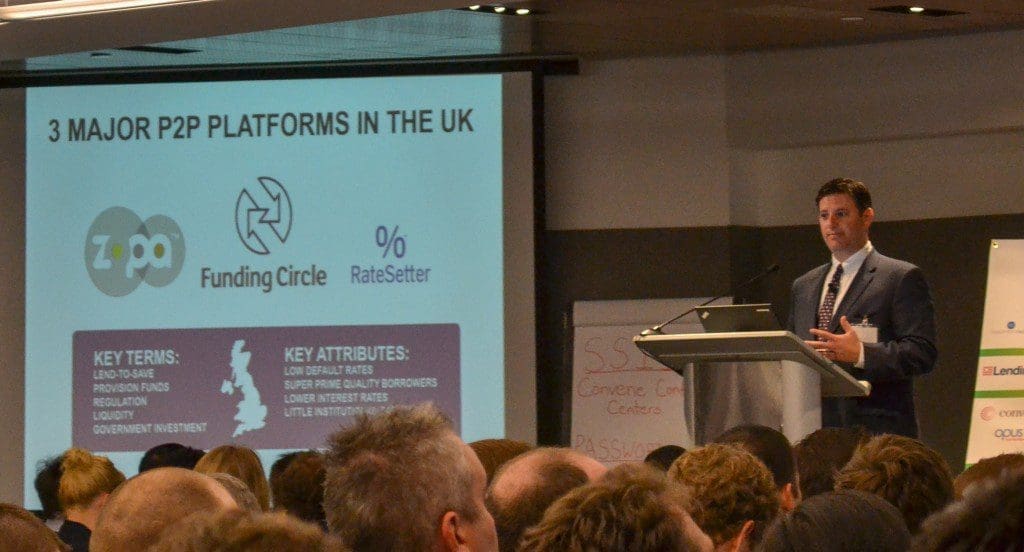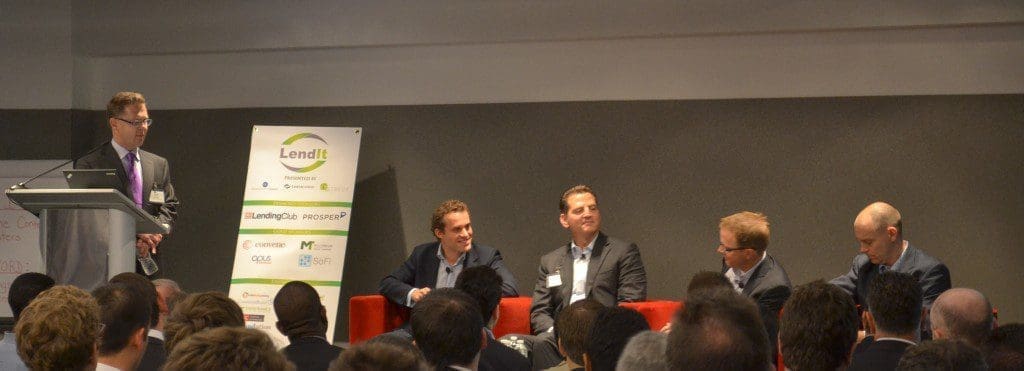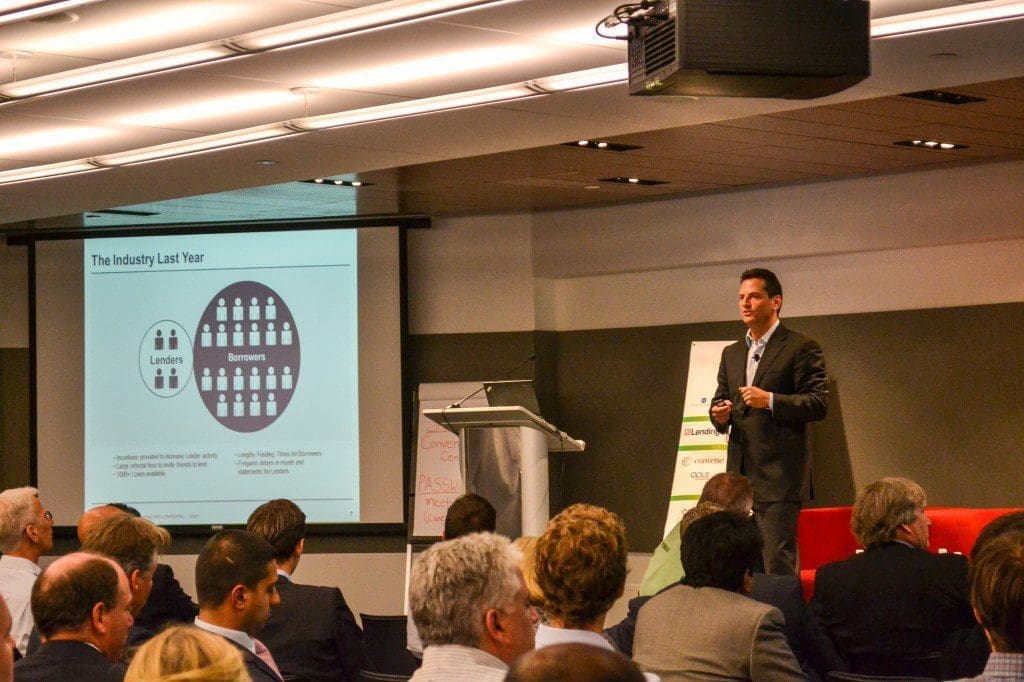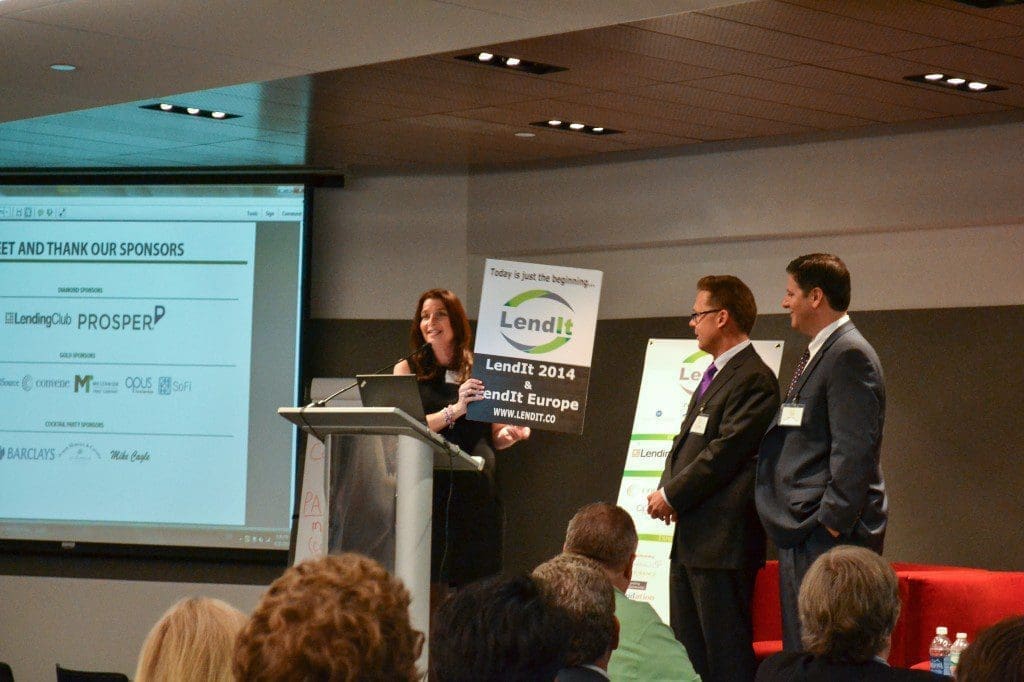Last Thursday around 340 people gathered at the Convene Conference Center in New York City for the inaugural LendIt Conference. It was a packed house. Unfortunately, we could not accommodate everyone who wanted to attend – we had to turn away many people who tried to register at the last minute because we were oversold.
The consolation that we told all these people was that we were streaming the entire event live online so they would be able to attend virtually. But Murphy’s Law took hold and at 8:20am, 10 minutes before the conference was due to begin, our Ustream feed went down. Something had happened at Ustream’s end. We delayed the start of the conference a few minutes to give the Ustream technicians a chance to fix the problem but it was still down when we started. It would take more than 40 minutes for the live feed to come back.
Renaud Laplanche Kicked Off LendIt 2013

Renaud Laplanche kicked off LendIt with a fascinating presentation about how Lending Club is transforming the banking system. He discussed how the speed of adoption of new technologies is increasing. And in many industries there are examples of disruptive companies taking down well-established incumbents. He gave Amazon and Netflix as two disruptive companies who took down very successful incumbents in their industry – Borders and Blockbuster.
Obviously, the implication is that Lending Club is a similar disruptive company. Laplanche pointed out that consumer satisfaction among the big banks remains very low. And most of their earnings gains recently have come through fees and cost cutting and not through market share growth. Not only that but they have a large legacy cost structure that will continue to burden them and gives Lending Club a huge advantage when competing.
One interesting tidbit that was in the fine print of Laplache’s presentation was that the expectation is that Lending Club’s operating costs will drop from 7.5% of outstanding loans in 2012 to 3.1% in 2015. Banks will obviously see no such substantial decline.
Laplanche ended the presentation with some big news that was released on the day of the conference. Two community banks have decided to invest their capital on Lending Club’s platform. So rather than competing with Lending Club they have decided to join the party. The transformation of the banking system has begun.
Global Overview of P2P and Online Lending

Next up was Jason Jones, one my LendIt co-founders, who gave an excellent presentation on the current state of global online lending. By this stage we had the live stream working so people were able to follow along online.
Here are some interesting facts from Jason’s presentation:
- Credit cards are still very popular with consumers but total outstanding credit card debt has dropped 20% since December 2008.
- Interest rates on all kinds of debt have dropped dramatically over the last 5 years except for credit cards.
- The U.S. is the biggest online consumer p2p lending market in the world with $2.4 billion in loans across three platform. China is not far behind, though, with $2 billion in total loans spread across 400 platforms. UK is a distant third at $800 million in total loans issued.
- Student loan debt is the only kind of debt that has kept increasing steadily over the last five years.
- Small business lending is migrating online with Amazon, Google and Lending Club looking to join established players like On Deck Capital and Kabbage.
The Consumer P2P Lending Panel

After Jason’s presentation was the first panel of the day, the Consumer P2P Lending Panel. I moderated this panel and I was joined by Peter Behrens from Ratesetter in the UK, Ron Suber from Prosper, Scott Sanborn from Lending Club and Matt Symons from SocietyOne in Australia. While I obviously couldn’t take notes while conducting this session here are some of the choice quotes that were shared on Twitter during this panel discussion:
Ron Suber: Half of the battle is educating everyone – lenders, borrowers, and even the states and banks.
Scott Sanborn: If interest rates go up this means that the economy is in better shape so defaults will fall leading to a lesser impact on investors.
Matt Symons: It’s is about offering more than a better interest rate to borrowers, it is about offering a better experience.
Scott Sanborn: Pricing and customer satisfaction are out of whack in the small business space right now – one of the many reasons that Lending Club is moving in that direction.
Peter Behrens: The annual default rate at RateSetter is 0.33%.
Matt Symons: There are 2 sides to every underwriting decision. 1 is character of the borrower, the other is ability to repay.
An Action Packed Rest of the Day
After my panel discussion the day went by in a blur for me. But there were some very interesting highlights that I picked up along the way:
- Charles Moldow is a partner at Foundation Capital (a Lending Club investor) and he explained how Renaud Laplanche has a valuation model, based on certain metrics (that he didn’t share) that he has stuck with in each of Lending Club’s funding rounds and it has been remarkably consistent.
- Frank Rotman is a partner with QED Investors (a Prosper investor) and he compared the time now to e-commerce around the turn of the century. In 2001 Wal-Mart saw no impact on their top or bottom line of a company like Amazon. They were just too small and not worth worrying about. Just like Lending Club and Prosper today are too small for banks to worry about.
- Kathryn Petralia, co-founder of Kabbage, was on the Better Data panel and I found it fascinating her description of the data Kabbage uses for underwriting decisions. She was talking about the kinds of data that her firm found the most useful in predicting defaults of loans obtained by eBay store owners. High eBay ratings and number of ratings were not as good a predictor as consistent seasonality, shipping to a wide range of zip codes and even the use of similar box sizes – that is the kind of data they are incorporating into their underwriting today.
- In the Direct Small Business Lending panel the talk was all about small business owners. For these people ease of use and speed of access often trumped interest rate. They want their money quickly (often same day) and they are willing to pay more for that privilege.
- In the Wealth Management panel, Howard Freedland talked about the better job that Lending Club and Prosper are doing today at pricing risk. He even suggested that institutional investors should look at p2p lending as an alternative to cash because the returns are so predictable.
I was not able to see all the main sessions because I attended some of the workshops (run by Simon of LendingMemo) that were happening concurrently. Michael from NickelSteamroller.com gave an excellent presentation about the Lending Club and Prosper APIs as well as a tour of the NSRPremium.com site. Matt and Angela from Orchard gave an excellent overview of where p2p lending is at now and where they believe it is going.
I lamented the fact several times that I couldn’t be in two places at once because there were several sessions I would have liked to have seen but couldn’t. I also wanted to chat with as many people as I could. The good news is that all the main sessions were recorded and the videos will be available shortly. I will let you know when that happens.
Closing LendIt Down with Keynote from Prosper’s Ron Suber

We ended the day with a keynote from Ron Suber of Prosper. Ron talked about collaboration and the fact that we need to work together. We have come a long way in the last couple of years as far as the media perception goes but there is more work to be done here.
He also did something very cool. He included a last minute slide that summarized what he had heard that day. He put that slide together in the afternoon, just minutes before he delivered the closing keynote. Here are the five takeaways from LendIt 2013 according to Ron Suber:
- The competition was not here today.
- The platforms are seeking controlled growth.
- Even as rates go up the search for yield will continue.
- Even more…money, platforms, technology.
- Banks and insurance companies now recognize the need to participate.
Even with all the enthusiastic talk he had heard that day he said none of us fully realize how big the opportunity really is here. We have made an excellent start but we are only in the top of the second inning in this industry. I think he is spot on there.
A Great Day of Content and Networking
What pleased me most about this day were the positive comments I received from dozens of attendees. Everyone was delighted to have been there are felt that both the content and the quality of people who attended was superb.
There was a palpable feeling that this was the start of something big. The level of excitement among the attendees as well as all the exhibitors was high. I had one of the exhibitors come up to me late in the day to tell me that people were so enthusiastic about her platform that venture capitalists were giving her their card and telling her to call them if she needs to raise another round. Other exhibitors reported a very busy time at their tables and many have said they will sign up right away for next year.
As for me, as I chatted with the attendees I was struck by how many people are in the process of putting together some kind of company focused on this industry. Plenty of new platforms are in the works, hedge funds are looking to launch, software tools being developed and some complex financial ideas I didn’t fully understand. One thing is for sure, though, we will see a lot of change in coming months.
LendIt 2014
After months of preparation the first LendIt is behind us. But, as Ron Suber said, we are only just getting started. There will be a LendIt 2014 conference coming in the spring of next year as well as a LendIt Europe later next year.
I would like to give a special thank you to my fellow organizers, Dara Albright and Jason Jones. It has been a ploeasure working with them both and I look forward to joining with them again to bring you many future LendIt conferences.


